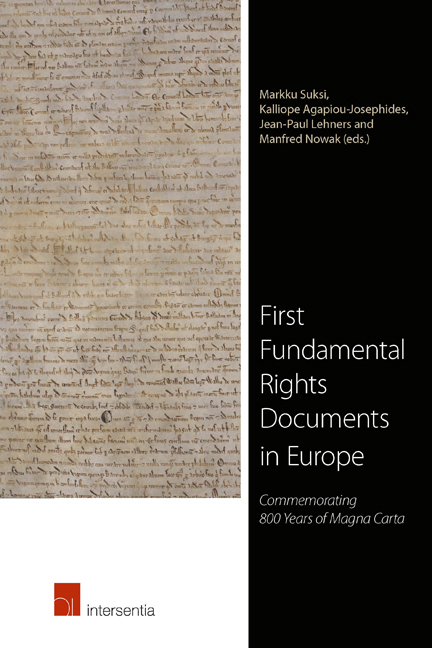Book contents
- Frontmatter
- Preface
- Contents
- List of Authors
- 1 Introduction
- PART I
- 2 The United Kingdom: From Magna Carta 1215 to the Rule of Law
- 3 Ireland: Individual and Group Rights in Ancient Irish Law
- 4 Italy: The Liber Paradisus — A Vision of Good Governance
- 5 Hungary: The Historic Constitution as the Place of Memory
- 6 Belgium: From Collective Privileges to Individual Rights
- 7 Austria: Manorial Regulation of Mining and Use of Forests as Potential Antecedents in Fundamental Rights
- 8 Spain: The First Cry for Justice in the Americas — From Antonio de Montesinos to the Laws of Burgos (1512)
- 9 Lithuania: From Equality to Inequality and to Equality Again
- 10 Poland: From the Golden Liberty of the Nobles to Fundamental Rights
- PART II
- Index
10 - Poland: From the Golden Liberty of the Nobles to Fundamental Rights
from PART I
Published online by Cambridge University Press: 15 December 2017
- Frontmatter
- Preface
- Contents
- List of Authors
- 1 Introduction
- PART I
- 2 The United Kingdom: From Magna Carta 1215 to the Rule of Law
- 3 Ireland: Individual and Group Rights in Ancient Irish Law
- 4 Italy: The Liber Paradisus — A Vision of Good Governance
- 5 Hungary: The Historic Constitution as the Place of Memory
- 6 Belgium: From Collective Privileges to Individual Rights
- 7 Austria: Manorial Regulation of Mining and Use of Forests as Potential Antecedents in Fundamental Rights
- 8 Spain: The First Cry for Justice in the Americas — From Antonio de Montesinos to the Laws of Burgos (1512)
- 9 Lithuania: From Equality to Inequality and to Equality Again
- 10 Poland: From the Golden Liberty of the Nobles to Fundamental Rights
- PART II
- Index
Summary
INTRODUCTION
This chapter presents the development of fundamental rights in Poland. Before discussing specific fundamental rights documents it is necessary to explain that the history of Poland until World War I is customarily divided into four periods, depending on the organisation of the state: the patrimonial state (the tenth to fourteenth century), the estate monarchy (13201454), the republic of nobles (1454–1795) and the partition of Poland (1795–1918).
It is also important to clarify that until the First Republic, Polish society was divided into several social estates (nobility, clergy, townsmen and peasants). In case of each of the estates, both the legal status and applicable laws were different.
ESTATE MONARCHY
The first fundamental rights documents applicable to all nobles and in the territory of the whole country were adopted in the fourteenth century. However, some relevant sectorial rulings were already in force before then. For example, economic or legal immunities were granted to individual landowners (lords and the church). The clergy gained significant tax privileges as early as thirteenth century. In 1264, a Kalisz Statute issued in the region of Great Poland granted the Jews legal protection and regulated the main juridical and economic issues concerning them. It also included some provisions relating to religious freedoms. For example, Jews could not be forced to give back collaterals on the days of their religious holidays. The Statute also forbade accusing Jews of using Christian blood. This provision was especially important because, at the time, many people believed that Jews slaughtered Christian children in order to use their blood for ritual purposes. Kings of the unified Poland later confirmed and updated this privilege, in order to apply it to the whole territory of the country.
The period of estate monarchy was characterised by the growing importance of the nobles. The kings, wanting to secure their support in wars or in issues such as succession, acceded to the demands of this powerful and wealthy estate. The privileges applicable to the nobility in this period concerned four main categories: fiscal obligations and other monetary responsibilities towards the state; military obligations; the right to property and its protection and specific rights related to court procedure.
- Type
- Chapter
- Information
- First Fundamental Rights Documents in EuropeCommemorating 800 Years of Magna Carta, pp. 123 - 136Publisher: IntersentiaPrint publication year: 2015



